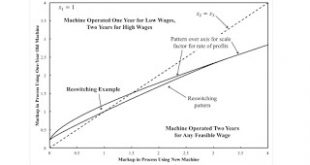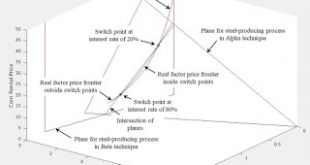[embedded content]Some Mathematics Useful In Understanding Classical Political Economy I consider the following to have been well established about half a century ago: Marginalism or so-called neoclassical economics is impossible to formulate consistently and with practical applications. A mathematically rigorous approach to the classical theory of value, from William Petty through David Ricardo, including Karl Marx, exists. Mainstream economists ignore the truth of both propositions....
Read More »Update To Example In Vienneau (2019)
Maybe this post should be titled "Erratum" or "corrigendum". I have an example in my paper last year in which wage frontiers are supposed to vary with two parameters. One is the markup in the "iron" industry. And the other is σ t. The example should be as in Table 1. All the theory and the visualizations in the paper work out with this example. Table 1: Technology for Producing Steel and Corn InputIndustryIronCornAlphaBetaLabora0,1 = 1aα,0,2(t) = (5191/5770) e(1/10) - σ taβ,0,2 =...
Read More »Elsewhere
John Weeks presents Joan Robinson's contributions to the Cambridge Capital Controversy (CCC). A discussion, from 2006, on Daily Kos, about one of my attempts to explain the CCC. A post, from 2016, on Naked Capitalism about how the CCC shows microeconomics is all wet. J. W. Mason has a handout explaining a definition of capital. Doyne Farmer, Fotini Markopoulou, Eric Beinhocker, and Steen Rasmussen, in an essay in Aeon, Collaborators in creation, provide an overview of complexity economics....
Read More »Universal Basic Income: Some Advocates And Analysts
"In fact, the realm of freedom actually begins only where labour which is determined by necessity and mundane considerations ceases; thus in the very nature of things it lies beyond the sphere of actual material production. Just as the savage must wrestle with Nature to satisfy his wants, to maintain and reproduce life, so must civilised man, and he must do so in all social formations and under all possible modes of production. With his development this realm of physical necessity expands...
Read More »Reswitching With Markup Pricing And Fixed Capital
Figure 1: Two Dimensional Pattern Diagram1.0 Introduction This post extends an example from Bertram Schefold. It presents markup pricing in an example with a machine that can be operated for two years or junked after one year. This is a case of joint production in which, unlike in some cases, the choice of technique can still be analyzed by the construction of the wage frontier. Also, I do not think the question of requirements for use enter in here, and all matrices are square. As usual,...
Read More »Precursors of Piero Sraffa
I want to consider contributions to economics after 1870 that reconsidered classical or Marxist economics, used input-output models and linear algebra, or bear a family resemblance to at least some points in Sraffa's 1960 book. Vladimir K. Dmitriev. Used input-output analysis in an interpretation of Ricardo's theory of value. Ladislaus Bortkiewicz. Had a simple three-good model, with one basic good, input-output model of prices of production. Sraffa and others argued against aspects of his...
Read More »Why Does The Labor Theory Of Value Work Empirically As A Theory Of Prices?
[embedded content]Anwar Shaikh On The Transformation Problem Lots of empirical work shows that prices tend to be proportion to the labor embodied in commodities. My references in this article document this claim. Furthermore, empirical wage-rate of profits curves tend to be close to straight lines. This is not what, say, Sraffa' mathematical economics would lead me to expect. What explains these surprising empirical findings? Almost 34 minutes in, in the above video, Shaikh makes the...
Read More »Only The Super-Rich Can Save Us!
Neoliberals are hostile to labor unions and every other institution that would allow the vast majority of the population to have some effect on how we are ruled. And they have been so successful that only the super-rich can save us, as the title of a Ralph Nader novel a few years back had it. A couple of recent examples of journalism are about movements of the super-rich: Sheelah Kolhatkar writes, in the New Yorker, about Patriotic Millionaires. Theodore Schleifer writes, in Vox, about...
Read More »Towards the Derivation of the Cambridge Equation with Expanded Reproduction and Markup Pricing
I have a new working paper. Abstract: Does the Cambridge equation, in which the rate of profits in a steady state is equal to the quotient of the rate of growth and the savings rate out of profits, hold in an economy with widespread non-competitive markets? This article presents a multiple-good model of markup pricing in an attempt to answer this question. A balance equation is derived. Given competitive conditions, this model can be used to derive the Cambridge equation. The Cambridge...
Read More »The Factor Price Frontier In The Space Of Factor Rental Prices
Figure 1: Real Factor Price Frontier1.0 Introduction Carlo Milana has proposed a new way of visualizing the choice of technique, including in the case of reswitching. This way of describing what he has done is not neccessarily how he thinks of it. In this post, I describe his approach with a reswitching example, in a model of the production of commodities by means of commodities. 2.0 Technology Table 1 shows the coefficients of production for this example. Coefficients of production...
Read More » Robert Vienneau: Thoughts Economics
Robert Vienneau: Thoughts Economics


